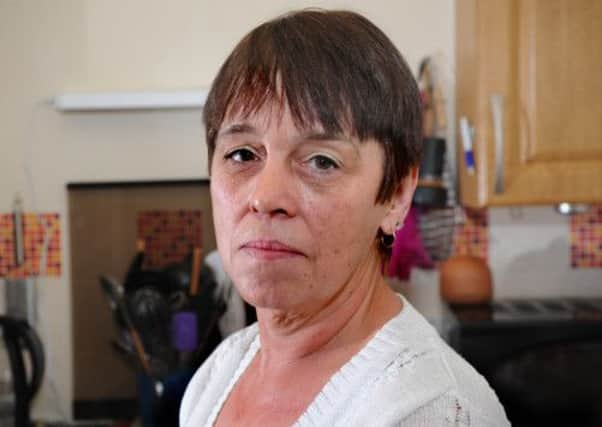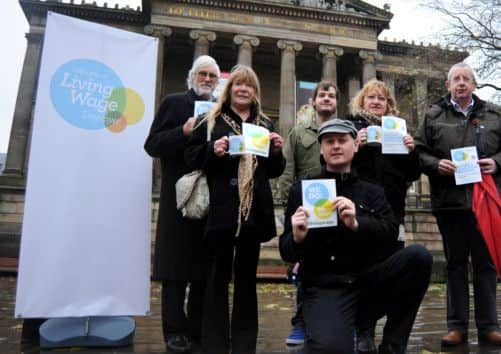‘Even wage earners can’t make ends meet’


Eight years after former Prime Minister Tony Blair and Gordon Brown promised to “Make Poverty History” in the Third World, it is firmly back on the agenda here in the UK.
With wages remaining stagnant, seeing only a 0.3 per cent rise over the past 12 months, in recent weeks the coalition Government has moved to break the historic link between Job Seeker’s Allowance and inflation, capping the annual rise at one per cent until 2015.
Advertisement
Hide AdAdvertisement
Hide AdThe bill came under heavy criticism when it emerged six out of 10 people affected by the decision would actually be in work. It was widely cited as further proof of the country’s “endemic culture” of low paid work and renewed calls for the introduction of a “living wage” of £7.45 per hour instead of the current minimum wage of £6.18.


The drive towards the living wage is an historic Yorkshire cause, with the Liberal MP for Dewsbury, Mark Oldroyd, calling for it all the way back in 1894. But it has gathered momentum over the past decade after the Living Wage Foundation was set up in London in 2001.
The organisation provides accreditation for hundreds of companies across the UK including companies and charities based in the region such as KPMG in Leeds and Involve Yorkshire and Humber in Bradford.
Sheffield City Council became part of that wider trend, voting to adopt a living wage for its entire staff across the city back in November. But Connie Gregory, from Shire Green in the city, who works at a secondary school, says the effect of this change will be more complex than it first appears.
Advertisement
Hide AdAdvertisement
Hide AdThis month, the 53-year-old will see a rise in the hourly wage she is paid for her work in the school’s kitchen for which she is directly paid by the council. However, her cleaning job, which was outsourced to a private company three years ago, will remain at £6.30 per hour.
Mrs Gregory, who will have worked at the school for 20 years in March, said: “We’ve been giving a service to the council, we’ve been loyal workers all these years, then it’s outsourced and we don’t get the benefits everybody else does which I think is wrong.”
She said the cleaning company have begun to expect more of her and her colleagues in the same amount of time despite her wages not increasing in three years. Although she said she is not as hard hit by wages stagnation, as she and her husband both work, her colleagues, some with young children, are really feeling the pinch.
A joint report published by think tanks the Institute for Public Policy Research and the Resolution Foundation earlier this month said 31 per cent of people living in the Yorkshire and Humber region earn less than living wage, set at £7.45 per hour outside of London.
Advertisement
Hide AdAdvertisement
Hide AdIt concluded if the living wage was introduced across the UK it could save the Treasury over £2bn a year and only increase the wage bill for large firms by one per cent.
IPPR and the Resolution Foundation stress the rate should be made voluntary.
Gavin Kelly, chief executive of the foundation said: “We need to encourage employers in every city, in the private as well as public sector, large and small, to adopt a living wage. Using some of the dividend received by the Exchequer is an innovative way of supporting this – sharing the proceeds of fairness to help cities take the initiative in securing decent pay for more people.
“Given plummeting wages and escalating levels of working poverty it is crucial that across the political spectrum there is a will to tackle this issue.”
Advertisement
Hide AdAdvertisement
Hide AdChris Goulden, Head of Poverty at the Joseph Rowntree Foundation in York agrees.
He said: “People are earning money but don’t have enough to cover the growing cost of essentials and make ends meet. Low wages means the state has to step in and foot the bill through welfare.
“The number of working families receiving working tax credits – payments to top up wages – has doubled since 2003 to 3.3 million in 2012.”
That according to some is just the tip of the iceberg as it fails to take into account students and employees under 25, who are not eligible for tax credits, despite being statistically more likely to be earning a low wage.
Advertisement
Hide AdAdvertisement
Hide AdJames Greenhalgh, 22, a politics student at Leeds University who earns £6.19 per hour working at the students’ union, said: “Why should I accept a wage that is different from what my colleagues are getting whilst doing a similar job?
“Because I’m a student, the union is saying students shouldn’t get the living wage because they have a student loan, but I don’t think it’s a good thing that you encourage a debt culture. Why should I have to sustain myself on credit cards and student loans when I’ve got the ability to work eight or 16 hours a week?”
It’s an anomaly which is recognised by the union’s board, but like many similar organisations, its hands are tied.
“The majority of students are not paid the living wage, but that is because their part time work at the union is not their living,” says the union’s affairs officer Antony Haddley.
Advertisement
Hide AdAdvertisement
Hide Ad“As chair of the board, I know that the financial implications of increasing the wages of all of the union’s student staff would be extremely hard to manage.
“However, I am committed to lobbying the University of Leeds to pay their non-student staff the living wage.”
While the living wage has many supporters, it’s far from a panacea with one think-tank predicting its introduction would hit young people the hardest with the loss of 160,000 jobs nationally.
There are also suggestions that demand for younger workers, 21 and under, with few or no formal qualifications would fall by 300,000 as employers seek more experienced candidates in return for higher salaries.
Advertisement
Hide AdAdvertisement
Hide AdToday, whether they are students who are struggling to make ends meet, or non students trying to take their first full time steps into the labour force, youth employment is currently at one in five nationally.
Both university graduates and school leavers are feeling compelled to complete unpaid work experience placements in order to get a job. Yorkshire already has one of the highest rates for youth unemployment in the country with areas like Wakefield and Bradford being particularly badly hit.
The problems associated with continuing high levels of unemployment often crowd out talk about increasing wages but living wage campaigner, George McManus, parliamentary spokesman for the Beverley and Holderness Labour party thinks it is still an issue people cannot ignore.
He is petitioning East Riding Council to pay the living wage to its direct and indirect employees and calculates 800 people could benefit.
Advertisement
Hide AdAdvertisement
Hide AdHe said: “Beverley and Holderness has a relatively low rate of unemployment and a relatively high rate of retired people. We don’t have a lot of people on means-tested people but a lot of working age people around here are not particularly well off.”
But the implementation of a living wage has so far has been patchy at best and as long as it remains a voluntary system it is likely to remain that way.
However, the Living Wage Foundation predicts calls for its widespread introduction may well gather momentum as the squeeze on living standards continued this year and possibly into the next.
However, while the campaign to ensure every worker in the UK has a right to decent wages is seen in most quarters as a worthy cause, its implementation is unlikely to solve all the region’s low pay problems.
Advertisement
Hide AdAdvertisement
Hide AdIn this very fragile economy the effect on the region’s most vulnerable workers, the potential hiring headache for small businesses and the reluctance of the private sector to participate could mean that thousands of employees in Yorkshire are left counting the cost.
Will the living wage pay off?
A recent KPMG showed that nearly 5m workers across the country currently earn less than a living wage.
In 2010 the Institute for Fiscal Studies calculated that bringing every private sector worker up to the living wage would raise total earnings (before tax) by around £12bn. Around half of that would go directly to the government, in higher tax revenues and lower benefit and tax credit payments.
The Living Wage Foundation says more than 45,000 families have been lifted out of working poverty as a direct result of companies voluntarily adopting a living wage policy.